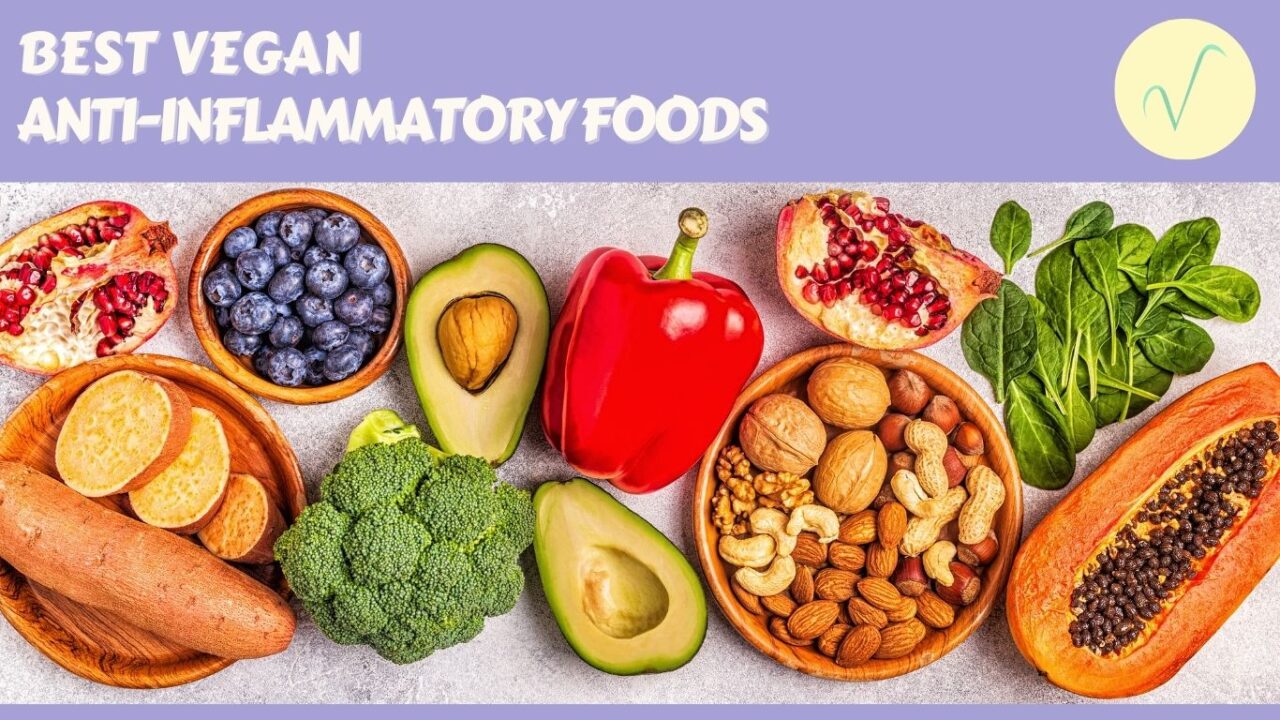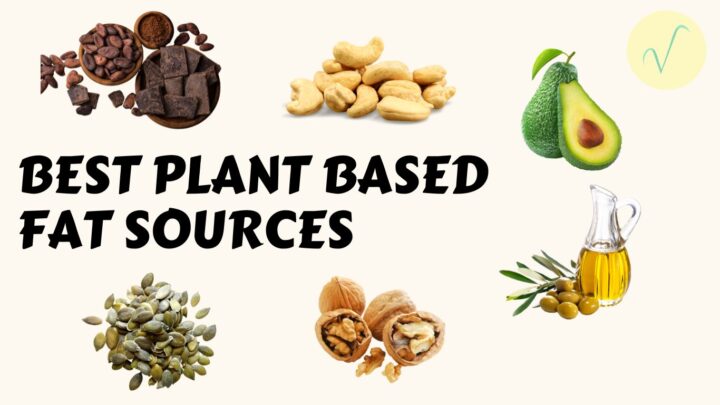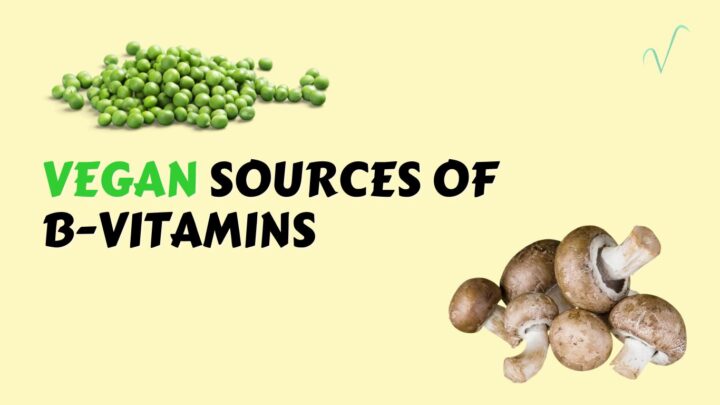This post is going to go through vegan anti inflammatory foods to include in your diet to lower inflammation. Be it for someone trying to reverse a chronic disease or just have handy, it’s good to know.
With a well-planned plant-based diet, there are a myriad of benefits to expect with long-term consistency. Some of these benefits being lowered blood pressure, better weight management, and reduced inflammation.
Of course, we can’t cover every food in the world in one post; we’ll go through a good few to add to your daily diet and weekly shop.

Veggies & Greens that combat inflammation
As your mum said and her mum before that, eat your greens. Here are some of the best veggies and greens that help combat inflammation.
Broccoli
Broccoli is rich in vitamins and minerals such as vitamin C & K as well as being packed with folate.
Kaempferol and quercetin are the active flavonoids that make it an anti-inflammatory food.
Kale
Kale is rich in calcium, vitamins A & K, and an easy-to-incorporate food that’s anti inflammatory.
Lettuce
Lettuce, being a go-to salad ingredient, is also anti inflammatory with its active biocatalysts such as Lipoxygenase and carrageenan.
A great food that you probably already eat regularly, to help you lower inflammation.
Red cabbage
Another cruciferous veggie for the list, red cabbage is also rich in antioxidants that helps reduce blood markers of inflammation with long-term consumption.
Spinach
Spinach is a leafy green that’s rich in Vitamin K, the active nutrient that gives it its anti-inflammatory properties.
String beans
String beans when boiled is rich in soluble fibre which helps to lower LDL cholesterol, this in turn contributes to lowering inflammation.

Fruit that helps lower inflammation
There are a wide range of fruits that help curb inflammation, let’s go through some of them below.
Apples
We’ve all heard the expression: An apple a day keeps the doctor away. Apples are anti-inflammatory due to them being rich in polyphenols. With active flavonoids quercetin and procyanidins that help provide these properties.
Blackberries
Blackberries are rich in anthocyanins, which are the antioxidants present in most berries that provide them with anti-inflammatory properties.
Blueberries
Blueberries are notoriously known as being high in antioxidants, due to the flavonoids that are helpful in reducing and controlling chronic inflammation.
A pro tip is to freeze them, as the antioxidants increase when frozen.
Citrus fruits
These include oranges, lemons and limes, which are rich in antioxidants to help control inflammation. Get yourself a bag of oranges today!
Cherries
Antioxidants found in cherries were found to lower pain and inflammation from osteoarthritis in a 2012 study, in this case looking at cherry juice.
Grapes
Grapes are rich in an anthocyanins, which work to reduce inflammation. Consider making them a part of your regular diet.
Kiwis
Kiwis work differently as they are high enzyme foods, which break down in the body to form antioxidant and anti-inflammatory complexes.
Mulberries
An easy way to get your daily berries in you is through some dried mulberries, which we spoke about in our vegan foods rich in calcium and vitamin C. Mulberry leaf is also used to combat inflammation and oxidative stress, for chronic diseases.
Raspberries
Raspberries have a plethora of bioactive compounds that work to lower system-wide inflammation. When eaten regularly can be used to help manage chronic diseases.

Grains to lower inflammation
There are also a good range of grains that you can use to help fight inflammation, with the right work ethic, these aren’t too hard to find either!
Quinoa
Quinoa is high in phytonutrients that help to lower inflammation. Ensure you rinse your quinoa properly before cooking.
Red rice
Note the keyword red, as regular rice doesn’t have the same bragging rights. According to health line, eating red rice may help lower inflammation.
Spelt
Spelt is an ancient grain not as common as refined wheat, as it’s basically the older version of it. Personally I prefer my spelt pasta and grain to regular wheat as it’s better on my digestion.
The finer and nutrients in spelt may help feed the good bacteria in the digestive system, helping to promote healthy digestion and lower inflammation.

Potatoes to lower inflammation
Only a few honourable mentions here, but important nonetheless.
Red potatoes
Redskin potatoes are those slightly more pricey potatoes, that pack more of a nutritional punch.
They are rich in antioxidants and a great alternative to conventional potatoes considering they taste the same!
Sweet potato
Sweet potatoes are rich in choline, a nutrient which helps to reduce inflammatory responses in the body.
To help control a long-term disease, you may want to consider adding sweet potato to your regular diet.

Legumes to lower inflammation
Legumes are anything from beans to peas. They’re rich in folate, as well as many other plant-based nutrients, and also help to lower inflammation.
Let’s go through a few of my faves.
Blackbeans
Blackbeans are rich in quercetin and saponins, plant-based flavonoids which helps produce an anti-inflammatory effect on the body.
Lentils
Lentils are rich in folate and finer which helps to lower inflammation after long-term consumption.
Red kidney beans
Red kidney beans have been found to be rich in nutrients, fibre and antioxidants, that help to lower inflammation by reducing quantity of c-reactive protein in the blood.
Peas
Peas are rich in vitamin C, iron as well as a bunch of antioxidants.
One nutrient, coumestrol, helps to reduce inflammation, for those looking for food suggestions to control chronic diseases.

Nuts & seeds to lower inflammation
Nuts and seeds, when eaten in their raw form, are nutritional powerhouses; They’re even better if soaked and activated!
They can also help you to lower inflammation if eaten correctly.
Almonds
Almonds are a vegan food rich in vitamin E, which in itself is an antioxidant. Get your daily dose of almonds to lower inflammation.
Black sesame seeds
From a recommendation given by my old Chinese doctor, black sesame seeds are key to control inflammation in the body.
Black sesame seeds appear to be a particularly rich source of antioxidants compared to regular sesame seeds.
Chia seeds
Chia seeds are considered a superfood, I personally love ‘em in smoothies and topped on soups.
Caffeic acid is the active antioxidant found in chia seeds to help curb inflammation.
Hazelnuts
Hazelnuts have been linked to lowered inflammation due to them being rich in healthy fats.
C-reactive protein was said to be affected by the regular consumption of hazelnuts in the diet.
Pumpkin seeds
Pumpkin seeds are rich in carotenoids as well as vitamin E; These antioxidants effective against free radicals and inflammation.
Sunflower seeds
Sunflower seeds are rich in Vitamin E and flavonoids, which are antioxidants that help to curb and lower inflammation.
Walnuts
Walnuts are rich in plant-based omegas, iron and magnesium.
One study showed that walnuts had a significant effect on inflammation, reducing it by up to 11.5% in the blood when testing inflammatory markers.

Top sources of vegan anti inflammatory foods
We hope you liked this list of plant-based anti-inflammatory foods, we tried to include a good list of fruits, veggies, grains and nuts to choose from, so you can make well-informed decisions.
Of course, do your own research beforehand, and consult your doctor about dietary changes if you’ve got a chronic condition yourself!
If you liked this post, feel free to bookmark, share and comment below what you want to see next. Thanks for stopping by.




